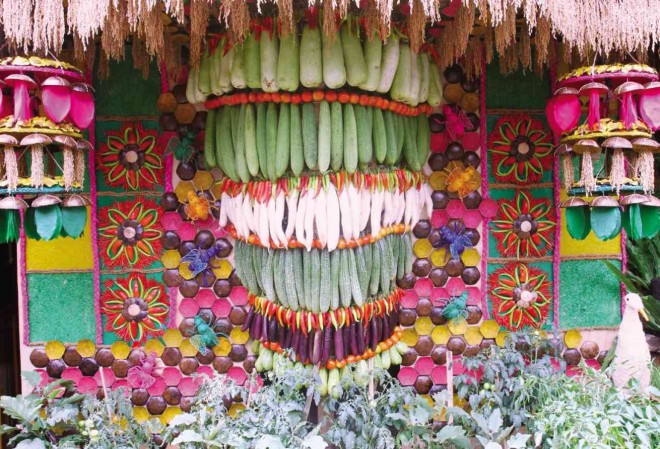‘Pansit Lucban,’ ‘longganisa’ await Pahiyas revelers

RESIDENTS adorn the façade of their houses with farm produce for the yearly Pahiyas San Isidro Festival in Lucban, Quezon. DELFIN T. MALLARI JR./INQUIRER SOUTHERN LUZON
Around two million tourists will troop to this town today (Thursday) at the foot of Mt. Banahaw to watch the Pahiyas San Isidro Festival that honors the farmers’ patron saint San Isidro Labrador.
The festival is a red-letter day for local entrepreneurs who mark the event because of the multitude of visitors joining the revelry.
Rimberto Veloso, proprietor of Eker and Ely’s longganisa, and one of more than 10 commercial sausage makers in Lucban, said May 12 to 19 is “one whole week of buying spree” for their product.
He said they have prepared at least 40,000 sausages for out-of-town buyers.
Chains of the reddish sausage, composed of ground pork spiced with garlic, crushed pepper, onion and oregano extracts stuffed inside dried pig intestines, adorn Veloso’s store, stalls at the public market and almost all souvenirs and giveaway shops scattered around town.
Article continues after this advertisementVeloso said their workers start production at 3 a.m. during Pahiyas season. Their main store at the back of St. Louise of Toulouse Parish Church also closes shop late in the evening to accommodate the nonstop rush of walk-in customers.
Article continues after this advertisementHe said buyers now prefer frozen sausages, which sell at the same price as the dried ones—P150 a dozen for jumbo size and P75 for regular.
Veloso’s parents, Eker and Ely, both meat butchers at the local market, were deemed pioneers of commercial longganisa business in Lucban which they started in the 1950s.
In another part of town, noodle makers at Racelis Mike (noodle) factory also double their production of fresh and oven dried noodle, for the arrival of the hordes of buyers.
The Pahiyas festival is the only time of the year when their outlets in Lucban, Tayabas and Sariaya towns and in Lucena City place high orders in anticipation of busy business, noted noodle factory owner Beth Racelis.
Visitors to this town and returning townsfolk from abroad now include the noodle, packed and sealed in plastic wrapper, as a regular part of their pasalubong that they carry back with them.
Sprinkled with vinegar laced with hot chili or soy sauce with calamansi, the saucy noodles is eaten habhab style or by slurping it from pieces of banana leaves without using spoons and forks.
Local restaurants and food stalls along the Pahiyas route offer this food experience to visitors.
On May 13, the whole town, particularly residents along the designated procession routes, have adorned the façade of their houses with farm produce, native suman and kiping, the colorful rice-based wafers that are almost synonymous with the local Maytime fiesta.
But the commercialization of the farmer’s feast, that dates back to practices of settlers during precolonial times to offer fresh farm produce to the anito for abundant harvest, has earned criticism.
Antonio Flores, secretary general of Kilusang Magbubukid ng Pilipinas, has called on the country’s farmers not to allow business interests to overshadow their thanksgiving.
Today, church and festival organizers have agreed to hold the religious procession in the morning and the festival parade in the afternoon to distinguish the spiritual character of the feast from the commercial ventures accompanying it.
The festival lasts until May 18.